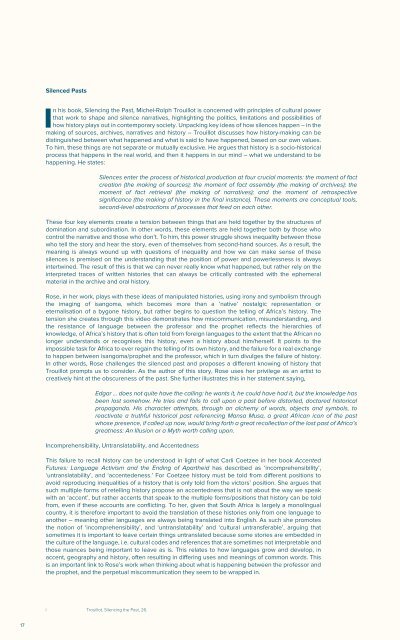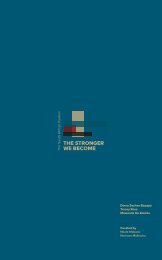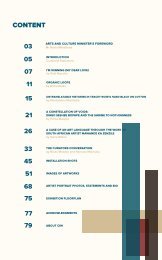The-Stronger-We-Become-Catalogue
Create successful ePaper yourself
Turn your PDF publications into a flip-book with our unique Google optimized e-Paper software.
Silenced Pasts<br />
In his book, Silencing the Past, Michel-Rolph Trouillot is concerned with principles of cultural power<br />
that work to shape and silence narratives, highlighting the politics, limitations and possibilities of<br />
how history plays out in contemporary society. Unpacking key ideas of how silences happen – in the<br />
making of sources, archives, narratives and history – Trouillot discusses how history-making can be<br />
distinguished between what happened and what is said to have happened, based on our own values.<br />
To him, these things are not separate or mutually exclusive. He argues that history is a socio-historical<br />
process that happens in the real world, and then it happens in our mind – what we understand to be<br />
happening. He states:<br />
Silences enter the process of historical production at four crucial moments: the moment of fact<br />
creation (the making of sources); the moment of fact assembly (the making of archives); the<br />
moment of fact retrieval (the making of narratives); and the moment of retrospective<br />
significance (the making of history in the final instance). <strong>The</strong>se moments are conceptual tools,<br />
second-level abstractions of processes that feed on each other.<br />
<strong>The</strong>se four key elements create a tension between things that are held together by the structures of<br />
domination and subordination. In other words, these elements are held together both by those who<br />
control the narrative and those who don’t. To him, this power struggle shows inequality between those<br />
who tell the story and hear the story, even of themselves from second-hand sources. As a result, the<br />
meaning is always wound up with questions of inequality and how we can make sense of these<br />
silences is premised on the understanding that the position of power and powerlessness is always<br />
intertwined. <strong>The</strong> result of this is that we can never really know what happened, but rather rely on the<br />
interpreted traces of written histories that can always be critically contrasted with the ephemeral<br />
material in the archive and oral history.<br />
Rose, in her work, plays with these ideas of manipulated histories, using irony and symbolism through<br />
the imaging of isangoma, which becomes more than a ‘native’ nostalgic representation or<br />
eternalisation of a bygone history, but rather begins to question the telling of Africa’s history. <strong>The</strong><br />
tension she creates through this video demonstrates how miscommunication, misunderstanding, and<br />
the resistance of language between the professor and the prophet reflects the hierarchies of<br />
knowledge, of Africa’s history that is often told from foreign languages to the extent that the African no<br />
longer understands or recognises this history, even a history about him/herself. It points to the<br />
impossible task for Africa to ever regain the telling of its own history, and the failure for a real exchange<br />
to happen between isangoma/prophet and the professor, which in turn divulges the failure of history.<br />
In other words, Rose challenges the silenced past and proposes a different knowing of history that<br />
Trouillot prompts us to consider. As the author of this story, Rose uses her privilege as an artist to<br />
creatively hint at the obscureness of the past. She further illustrates this in her statement saying,<br />
Edgar … does not quite have the calling: he wants it, he could have had it, but the knowledge has<br />
been lost somehow. He tries and fails to call upon a past before distorted, doctored historical<br />
propaganda. His character attempts, through an alchemy of words, objects and symbols, to<br />
reactivate a truthful historical past referencing Mansa Musa, a great African icon of the past<br />
whose presence, if called up now, would bring forth a great recollection of the lost past of Africa’s<br />
greatness: An Illusion or a Myth worth calling upon.<br />
Incomprehensibility, Untranslatability, and Accentedness<br />
This failure to recall history can be understood in light of what Carli Coetzee in her book Accented<br />
Futures: Language Activism and the Ending of Apartheid has described as ‘incomprehensibility’,<br />
‘untranslatability’, and ‘accentedeness.’ For Coetzee history must be told from different positions to<br />
avoid reproducing inequalities of a history that is only told from the victors’ position. She argues that<br />
such multiple forms of retelling history propose an accentedness that is not about the way we speak<br />
with an ‘accent’, but rather accents that speak to the multiple forms/positions that history can be told<br />
from, even if these accounts are conflicting. To her, given that South Africa is largely a monolingual<br />
country, it is therefore important to avoid the translation of these histories only from one language to<br />
another – meaning other languages are always being translated into English. As such she promotes<br />
the notion of ‘incomprehensibility’, and ‘untranslatability’ and ‘cultural untransferable’, arguing that<br />
sometimes it is important to leave certain things untranslated because some stories are embedded in<br />
the culture of the language, i.e. cultural codes and references that are sometimes not interpretable and<br />
those nuances being important to leave as is. This relates to how languages grow and develop, in<br />
accent, geography and history, often resulting in differing uses and meanings of common words. This<br />
is an important link to Rose’s work when thinking about what is happening between the professor and<br />
the prophet, and the perpetual miscommunication they seem to be wrapped in.<br />
4 Trouillot, Silencing the Past, 26.<br />
17




